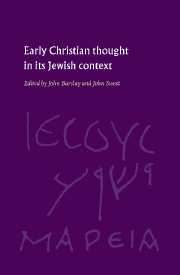Book contents
- Frontmatter
- Contents
- List of contributors
- Preface
- List of works by Morna D. Hooker
- List of abbreviations
- Chapter 1 Introductory Essay
- I THE SOCIAL CONTEXT OF EARLY CHRISTIANITY
- II SOME EARLY CHRISTIAN SOURCES
- Chapter 4 Jesus
- Chapter 5 Matthew
- Chapter 6 Mark
- Chapter 7 Luke–Acts
- Chapter 8 John
- Chapter 9 Paul
- Chapter 10 Deutero-Pauline letters
- Chapter 11 Hebrews
- Chapter 12 Revelation
- Chapter 13 Other early Christian writings: ‘Didache’, Ignatius, ‘Barnabas’, Justin Martyr
- III SOME EARLY CHRISTIAN THEMES
- Index of names
- Index of subjects
- Index of texts
Chapter 7 - Luke–Acts
from II - SOME EARLY CHRISTIAN SOURCES
Published online by Cambridge University Press: 22 September 2009
- Frontmatter
- Contents
- List of contributors
- Preface
- List of works by Morna D. Hooker
- List of abbreviations
- Chapter 1 Introductory Essay
- I THE SOCIAL CONTEXT OF EARLY CHRISTIANITY
- II SOME EARLY CHRISTIAN SOURCES
- Chapter 4 Jesus
- Chapter 5 Matthew
- Chapter 6 Mark
- Chapter 7 Luke–Acts
- Chapter 8 John
- Chapter 9 Paul
- Chapter 10 Deutero-Pauline letters
- Chapter 11 Hebrews
- Chapter 12 Revelation
- Chapter 13 Other early Christian writings: ‘Didache’, Ignatius, ‘Barnabas’, Justin Martyr
- III SOME EARLY CHRISTIAN THEMES
- Index of names
- Index of subjects
- Index of texts
Summary
The attitude to Judaism of the author of the Third Gospel and of Acts, which I take to be related to each other and to come from the same writer, whom for convenience I call Luke, has been variously assessed. Tradition, guided by Col. 4.10–14, makes him a Gentile, but he has often been taken to be a Gentile with strong interest in and inclination towards Judaism. Thus
There is a measure of probability that, before he became a Christian, he was one of the so-called ‘God-fearers’, … as such he was already, before his encounter with the Gospel, familiar with the Old Testament and had also acquired some acquaintance with Jewish matters … Such a preparation would also explain the fact that he shows in Acts … a well-informed interest in proof from Scripture …
At the other end of the spectrum, J. T. Sanders sees Luke as an implacable enemy of Judaism. ‘In Luke's opinion, the world will be much better off when “the Jews” get what they deserve and the world is rid of them.’ There is a balanced discussion in Tyson 1992: ‘It is incorrect to maintain that Luke is simply pro-Jewish or simply anti-Jewish. He is both’ (p. 188). It could be said that it is impossible to be a Christian without being both – so long as anti-Jewish is understood to mean ‘disagreeing with official Judaism on some important matters’ and not to mean ‘hating, or even disliking, Jews’.
- Type
- Chapter
- Information
- Early Christian Thought in its Jewish Context , pp. 84 - 95Publisher: Cambridge University PressPrint publication year: 1996
- 2
- Cited by



